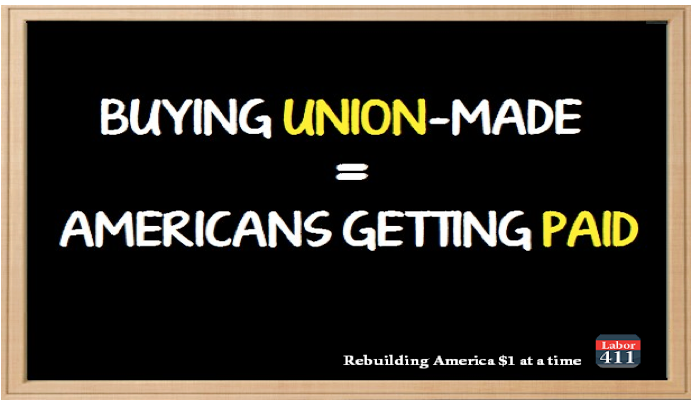CommentsDECISIONS, DECISIONS-Research shows that adults make somewhere in the neighborhood of 35,000 choices on a daily basis. The comforting news is that we don’t need the really powerful part of our brains for most of them. That’s a good thing because, as anyone who has scrolled through a lineup of 1,000 cable channels or perused the cereal aisle in a major supermarket can attest, decisions – even the most seemingly mundane – can be agonizing.
But there are many decisions we make every day that do have wide-ranging impact. Let’s start with a surprising one – the choices we make every time we open our wallets. Six years ago, on Labor Day, I decided to try an experiment for three months to focus my buying decisions on ethical choices that would help create jobs in my community, and around the country. I chose to see if it was possible to purchase only union-made products and services in America today. I found out quickly it wasn’t always easy for me to do. But it was the right choice, and I had plenty of resources. Having spent much of my professional life working for or within the labor movement, I knew which cereals, beers and cars were made by companies that treat their workers fairly.
These are the choices that we enjoy as free market American consumers, and while we may occasionally debate over Coors vs. Budweiser, we don’t lose too much sleep over it. Heck, Americans spend more than $5 trillion per year on consumer products alone. Shopping is in our DNA. In 2015, consumers spent $770 billion on groceries, more than $780 billion in restaurant sales and nearly $100 billion on hotels and motels.
What if we captured just a portion of that tidal energy to generate a revived American economy?
Our purchasing decisions – if made with some consideration – can be focused into what I like to call an Ethical Consumer Movement. I’m talking about a national movement through which we use the power of our spending dollars to speak out in favor of responsible businesses and against those that do not pay their workers the wages and benefits that they deserve.
During the primary season this year, Americans were treated to spirited discussions on both sides of the aisle about our country’s increasing problem with income inequality. According to the Economic Policy Institute, in 2015, CEO pay rose to 276 times the annual average pay for the typical worker. This is up from what now looks like a very reasonable 20-1 ratio in 1965. All the while, productivity continues to rise, but wages have stagnated. Consider, the federal minimum wage is still $7.25 in 2016, stuck at the same rate it’s been for more than seven years.
One of the responses to this inequity, naturally, is to raise the minimum wage, and cities from Los Angeles to New York have taken action. I applaud this, as no one should be making poverty wages for an honest day’s work. But simply increasing the floor isn’t enough. Change doesn’t have to come from the top down, or from the ballot box. Change can begin at home, every day, and progress incrementally for a long-lasting impact.
If we as consumers only spend our hard-earned dollars on high-road businesses, the “rising tide lifts all boats” argument would take care of the rest. American businesses that pay their employees fairly and treat them well would prosper, and the others would pass by the wayside. The middle class, and America, would strengthen, and that pesky income inequality problem would slowly shrink. This is grassroots at its simplest.
All this comes back to making decisions. This Labor Day, and every day, when at the supermarket or looking to buy a car, an appliance or considering which hotel to stay at, keep in mind where your money is going, and how those people making a product or providing a service are treated. Consider if they’re being paid fairly and justly.
How can you help?
By making the right choice.
(Cherri Senders is the founder and president of Labor 411, a consumer guide to union-made goods and services.) Prepped for CityWatch by Linda Abrams.
Sidebar

 CityWatch Los Angeles
Politics. Perspective. Participation.
CityWatch Los Angeles
Politics. Perspective. Participation.
18
Thu, Apr














